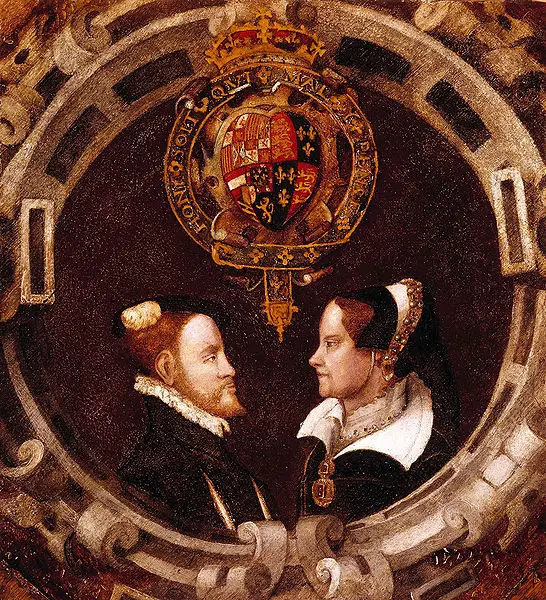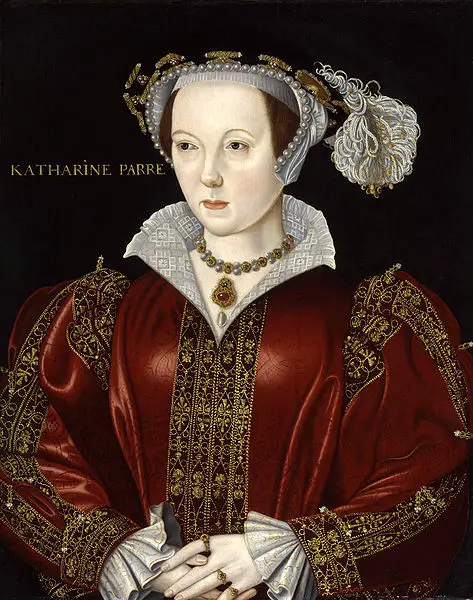Thomas Vaux was just fourteen when he married Elizabeth Cheyne, daughter of Sir Thomas Cheyne and Anne Parr, in 1523. The couple went on to have four children, two sons and two daughters.
Nothing is known of his early life and education, but in 1527 he went to France as part of Cardinal Wolsey's retinue, in 1529 he sat in Parliament and in 1532 he was part of Henry VIII and Anne Boleyn's party when they travelled to Calais to meet Francis I. He was created a Knight of the Bath as part of the celebrations for Anne Boleyn's coronation in 1533 and he held the office of Governor of Jersey from January to August 1536. His Oxford Dictionary of National Biography biographer, H. R. Woudhuysen, notes that he appears to have retired to his estates in Northamptonshire after this, probably because of his Catholic views.
Vaux' date of death is unknown, but he was buried in October 1556 and his wife died in November of that year, suggesting that they may have been victims of the plague.
Vaux was an associate of the poets Thomas Wyatt the Elder and Henry Howard, Earl of Surrey, and his poetry, which Woudhuysen describes as "all original compositions rather than translations or imitations" and on the theme of the trials of love, can be found in Tottel's Miscellany and The Paradise of Dainty Devices. He has been confused in the past with his father, Nicholas, who also wrote poetry. The poem "The Aged Lover Renounceth Love" is found in Tottel's Miscellany, where it is unattributed, but the MS Ashmole 48 and Harley MS 1703 both attribute it to Vaux and poet George Gascoigne (c.1535-1577) wrote of how it was said to have been composed by Vaux on his deathbed. Here it is:
I loathe that I did love,
In youth that I thought sweet,
As time requires for my behove,
Methinks they are not meet.
My lusts they do me leave,
My fancies all be fled,
And tract of time begins to weave
Grey hairs upon my head,
For age with stealing steps
Hath clawed me with his crutch,
And lusty life away she leaps
As there had been none such.
My Muse doth not delight
Me as she did before;
My hand and pen are not in plight,
As they have been of yore.
For reason me denies
This youthly idle rhyme;
And day by day to me she cries,
“Leave off these toys in time.”
The wrinkles in my brow,
The furrows in my face,
Say, limping age will lodge him now
Where youth must give him place.
The harbinger of death,
To me I see him ride,
The cough, the cold, the gasping breath
Doth bid me provide
A pickaxe and a spade,
And eke a shrouding sheet,
A house of clay for to be made
For such a guest most meet.
Methinks I hear the clark
That knolls the careful knell,
And bids me leave my woeful wark,
Ere nature me compel.
My keepers knit the knot
That youth did laugh to scorn,
Of me that clean shall be forgot
As I had not been born.
Thus must I youth give up,
Whose badge I long did wear;
To them I yield the wanton cup
That better may it bear.
Lo, here the barèd skull,
By whose bald sign I know
That stooping age away shall pull
Which youthful years did sow.
For beauty with her band
These crooked cares hath wrought,
And shippèd me into the land
From whence I first was brought.
And ye that bide behind,
Have ye none other trust:
As ye of clay were cast by kind,
So shall ye waste to dust.
Notes, Sources and Further Reading
Picture: Sketches of Thomas Vaux and his wife, Elizabeth, by Hans Holbein the Younger.
- Woudhuysen, H. R.. “Vaux, Thomas, second Baron Vaux (1509–1556).” H. R. Woudhuysen In Oxford Dictionary of National Biography, edited by H. C. G. Matthew and Brian Harrison. Oxford: OUP, 2004. Online ed., edited by David Cannadine, January 2008. http://www.oxforddnb.com/view/article/28163
- Tottel's Miscellany can be read at https://archive.org/details/tottelsmiscella00arbegoog - Poems said to be written by Thomas Vaux include "Thassault of Cupide upon the Fort where the Lovers Hart Lay Wounded and how he was Taken" (p. 172), "The Aged Lover Renounceth Love" (p. 173), "The Frailtie and Hurtfulnes of Beautie" (p. 10, attributed to Henry Howard) and "Against an Unstedfast Woman".
- The Paradise of Dainty Devices can be read at https://archive.org/details/paradiseofdainty027377mbp. See poem number 17, "Of the instabilitie of youth", for example.




Leave a Reply